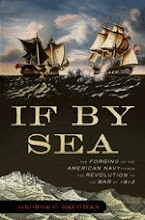'Naval-gazing never so agreeable as in Portland writer's 'If By Sea'
'' 'If By Sea', a new book by Portland resident George C Daughan, is a sprawling fact-packed, generally successful attempt to chronicle the slow painful birth of what became the United States Navy.
"The reader must stand in awe of Daughan's command of specific glittering incidents and individuals in the context of his abiding overall knowledge of naval, military, political, economic and social developments across the Atlantic world from 1775 to 1815.
"Daughan, who earned his doctorate in history at Harvard University and taught history and government at various colleges (including the University of New Hampshire), is clearly steeped in his subject. He understands it fully, from naval personnel to the vessels themselves to the politics of supply and support. Indeed as the winds of revolutions blew through the 13 colonies (all of them maritime to some degree), sea fighting occurred.
" 'If By Sea' opens inevitably and appropriately on April 18, 1775, which we all know as "two if by sea" signaling Paul Revere and the rebels that the British were crossing ("by sea") the Charles River. Thus, from the first page, the reader sees how tightly Daughan cleaves to events that are not strictly blue water. The importance of British Admiral Graves' ambivalence and later attempts to get tough by burning Falmouth (now Portland) are part of the weave."
William David Barry - August 10, 2008
William David Barry is a local (Maine) historian who has authored/co-authored five books, including "Tate House:Crown of the Maine Mast Trade" and the novel "Pyrrhus Venture".


